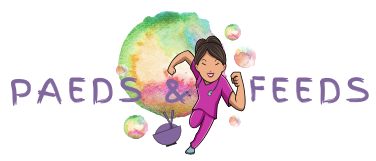Hey there everyone!
You all know how much I love food, and I can only hope that my kids will develop a passion for eating and cooking one day just like me (.. can I just say it’s not looking great with the littlest one at the moment – he chews everything and spits it all back out again or just goes “Uh UH!!” and turns his head away *eye roll*). Introducing solids for the first time can be a little anxiety provoking and confusing for some parents, so if this is you, here is a guide to help you out.
Your baby has depended on you for breastmilk and/or formula for the first 4 months of their life, which has been the only source of nutrition for them up until this point… but what do you do now?
EVERYONE you ask (and even people you don’t ask, like people at the bus stop, in the check-out queue at the supermarket etc) will have an opinion on what you should or shouldn’t be doing when first introducing solids to your baby. If you are so inclined to TELL them what you are doing, they might “tut tut” you, or tell you what they did with their children, or what their mother did for them… (**eye roll**)
After doing a quick Google search myself this morning, I can see that there is a lot of mixed information out there.
- Start with rice cereal vs Start with vegetables
- Don’t give meat initially vs Do give meat
- Start at 6 months vs Start at 4 months
The minefield of “Google-able” information out there makes things so hard for parents. Look guys, to be honest, there really isn’t a hard-and-fast “right way” to do it. There are plenty of ways to skin a cat and more than one right way to go about things. Also, each child is different, and some kids take to eating solids really quickly, others gag on chunky textures for ages before they get the hang of it. Both these scenarios can be normal.
However, let me tell you what IS important…
Why do we need to give babies solids so soon?
This is an easy question to answer! When your baby is born, the iron that it has stored for use in its body came from their mother (via shared blood circulation) in the womb. By the time a baby gets to 6 months of age, they have depleted their stores of iron (and other nutrients) and have to start topping up these stores by eating solids. They need this in order to grow and develop normally.
This is not the only reason however. Your baby also needs
- To learn to eat
- To be exposed to a range of new textures and tastes
- To develop the jaw muscles and taste buds, and strengthen muscles they will need for language later on!
When exactly should solids be offered?
- When the baby shows signs of being ready for solids
- Good head and neck control and able to sit upright
- Shows interest in food
- Opens their mouth when you offer a spoonful of food
This usually happens between 4-6 months of age.
I personally recommend starting solids at 4 months (but the Australian guideline states “no earlier than 4 months, no later than 6 months”). It takes time for a baby to learn to eat and get used to textures and tastes. You might need to offer solid food many times before it is finally accepted. I think it is better to give them more time with less pressure, than to worry if you first introduce solids at 6 months and they don’t take to it well straight away (whilst worrying about depleted iron stores). Meanwhile a word of warning – when introducing solids, be prepared for the despair and frustration of throwing out LOADS of your carefully prepared home cooked and pureed food, vegie and fruit sticks and half-finished yoghurts… so frustrating!
Initially – offer solids AFTER a breastfeed or bottle. You want baby to be happy and relaxed when offering food, and they won’t be if they are ravenously hungry and just wanting their milk!
What TYPE of food should you offer?
Here’s the thing: you can introduce solids in ANY ORDER, as long as you introduce foods that are rich in iron, and are the right texture for their developmental stage. You can mix foods together (yes, you can introduce more than one food at a time; unless you have a strong family history of food allergy – then do one at a time).
Examples of good first time foods:
- Cooked pureed vegies (pumpkin, potato, carrot, peas, beans)
- Cooked pureed fruit (apple, pear), later mashed banana and avocado (which is thicker and lumpier)
- Cooked pureed pasta, rice with protein &/or vegies
- Protein – cooked pureed pork, fish, chicken, beef and cooked egg
- Dairy – full fat cheese and yoghurt
Food TEXTURE and QUANTITY
- Always start with pureed food initially, and offer 1-2 teaspoons increasing as needed, twice or three times a day.
- You can make the food texture thicker as baby gets used to it.
- Transition from smooth to soft lumpy textures at about 8 months – this is important for baby to learn to chew and subsequently speech development, and prevents feeding difficulties and textural aversions. It takes some babies longer than others to adjust to the texture change (don’t expect them to “get it” straight away)
- Finger food can be offered by 8-10 months eg sticks of cooked vegetables and soft fruit (NOT hard fruit like uncooked apple slices/chunks, berries, raisins = choking hazard), sandwich fingers/toast
- By 12-18 months, your baby will be eating (a smaller version of) your family’s meal (with some exceptions of course eg chewy meat like steak)
What about foods that commonly cause allergy?
ASCIA (Australasian Society of Clinical Immunology and Allergy) recommends all babies (including those with a high allergy risk) should be given allergenic solid food (ie food known to commonly cause allergy) including smooth peanut butter, cooked egg, dairy and wheat products in the first year of life. This protects your child against developing an allergy!
Other important points to note:
- Solids do not replace breastfeeding or formula – at least not straight away. The bulk of your baby’s calories still come from breastmilk and/or formula up until they establish a good solid-food diet.
- Don’t give your baby:
- cow’s milk before age 12 months*
- HONEY before 12 months of age (it contains a bacteria that can cause botulism)\
- Whole nuts or hard foods (eg seeds, raisins, apple chunks, raw vegetables, popcorn, sausages etc) until after 3 years old – these are a choking hazard
- Unpasteurised milk at ANY age
- Soft drink, juice, sugar sweetened drinks at ANY age
- Added salt/sugar etc – they do not need it and it is not good for them
- Always supervise babies and young children eating. Sit with them (or as I like, sit together as a family at the table) to prevent choking and encourage social interaction, and learning to eat by observation and imitation.
- Give full fat dairy from 12 months until 2 years of age (then can change to reduced fat if desired; or continue)
- Never FORCE your baby to eat… learning to eat takes time and patience. Let it be fun for them. Let them be messy. Let them explore the food.
*Why no cow’s milk before 12 months?
“Infants fed whole cow’s milk receive inadequate amounts of Vitamin E, iron, essential fatty acids, and excessive amounts of protein, sodium, and potassium. These levels may be too high for the infant’s system to handle.” (AAP) – that is, there aren’t enough nutrients, vitamins and minerals in cow’s milk to support your baby’s growth and too much sodium, potassium and protein to be good for their kidneys. Also, babies can find cow’s milk hard to digest (and it can cause gas, pain and diarrhoea). By 12 months, they should be eating a good varied diet of solids – so those nutrients come from elsewhere.
So I hope this has been helpful post to sort the fact from the fiction!
As usual, please SHARE the post on Facebook to reach out and help as many people as possible!
Until next time,
Happy eating
xxDr Megs

